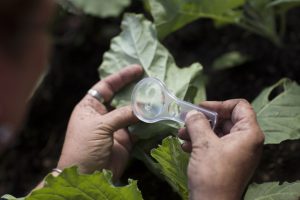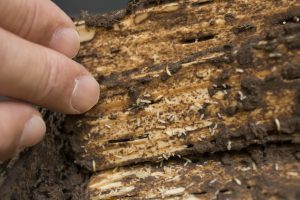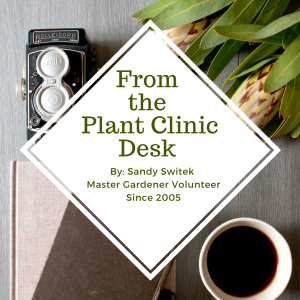February was National Pesticide Safety Education Month but is not too late to learn about it.
By definition, a pesticide is actually anything used to kill or repel insects, fungi, mold, mildew, diseases, animals, or weedy plants. For obvious financial reasons, many homeowners choose to do some of these jobs themselves.
However, there are some scenarios which we do not want to happen.
Reusing containers
Let’s learn from some of the mistakes which have already been made. Accidentally killing or damaging various good plants and lawns has been a reality for a few homeowners. In one case, a homeowner was merely spraying a natural fungicide on the plants. But for some reason, all of the plants became very sick. It turned out that the disaster could have been prevented if the person had washed out the spray tank after using all of the Roundup that was in it before.
Windy Days
In the next case, a brush killer was used to spray on some vines growing up a tall tree trunk. However, two small trees died, and part of the lawn suffered severe damage. The problem was that it was quite windy that day. A better option would have been to cut the trunk of the vine near the ground and paint it with undiluted brush killer.
Not following directions
Another common mistake would be mixing the pesticide stronger than the label specified. This can have similar results and isn’t even legal.
Not IDing the problem
Other times, sprays may just be unnecessary or useless, since the pest was either not identified or not researched. While love bugs are a nuisance, they do not damage homes or plants, and should be left alone. They will disappear at the end of their season. A similar example would be the jadera bug, which only eats seeds from the invasive Golden Raintree. In reality, the bugs are helping to control the rampant seeding of Golden Raintrees everywhere, and do not harm anything. A better choice would actually be to remove the invasive tree. Spraying the outside walls of your house will not eliminate the bugs or accomplish anything.
Mushrooms are not bad
A final example would be spraying mushrooms in your lawn or garden. They are harmless to your yard and are merely breaking down rotting plant matter in the soil. Just don’t eat them unless you are an expert on ID.
Home remedies
What about the home remedies with soap, vinegar, salt, or dish detergent? Those are actually pesticides when used to control insects or diseases. While it is not illegal to use these in your own yard, it does become so if you share them with a neighbor. It is also not legal to sell your veggies or plants after using these home remedies on them. But mainly, it can be a risky thing to do to your plants, because there is no label to prevent misuse. Labels require extensive testing and will protect your plants from overdoses.
Let’s Practice Integrated Pest Management

The truth is that spraying chemicals on things should just be the last line of defense anyway. This is part of the IPM (Integrated Pest Management) idea. It is designed to minimize risk to people, pets, and the environment. Here are a few principles. First, select plants which are insect and disease resistant. If pests appear, try manual removal first. Next, ID the pest, and find that particular pest on your pesticide label before use. Consider
environmental safety and toxicity, starting with natural or low toxicity pesticides. Spray early or late in the day, when bees are less likely to be active. Also find out which pests attack which plants.
Let’s Change Cultural Practices
Other principles involve cultural aspects. Irrigate, fertilize, prune, and mulch correctly. A healthy plant is less susceptible to pests and diseases. Putting the plant in a good location is also important to its health and resistance to pests. A sun loving plant needs a sunny, well ventilated spot. Choose disease resistant varieties whenever possible. Even better than that, look for plants that don’t even require chemicals. For veggies, be sure to rotate crops.
Personal Safety
What about personal safety? Skin rashes can result from direct contact with some pesticides. Contact with eyes, nose, or mouth is worse. Be sure to wear gloves, long sleeves, long pants, close-toed shoes, hat, goggles, and ideally, a face shield. Wash hands immediately and before eating or using the bathroom. Wash clothes in a separate wash load after use. Store your pesticides somewhere where children can not get into them. Pesticides stored in drink bottles are especially tempting to them. Remove pet dishes before pesticide use. Do not put rodent baits where wildlife or kids can reach them.
Tips:

- If you suspect termites, do not try to control them yourself. Call a professional.
- If you have unwanted pesticides, do not pour them in drains or sewers, but take them to a household hazardous waste disposal site.
- A final important point is to go out and look at your plants often. This makes it possible to eliminate pests before they become a major problem.
Need more information:
For more information about Florida Friendly Plants and Wildlife you can email me at epabon5@ufl.edu or like us to learn about new classes or events at Gardening in Central Florida
By: Sandy Switek since 2005 and Eva Maria Pabon Residential Horticulture Agent
Do you want to read more about gardening? Follow our blog Eva Pabon, Author at UF/IFAS Extension Osceola County (ufl.edu)
 0
0

